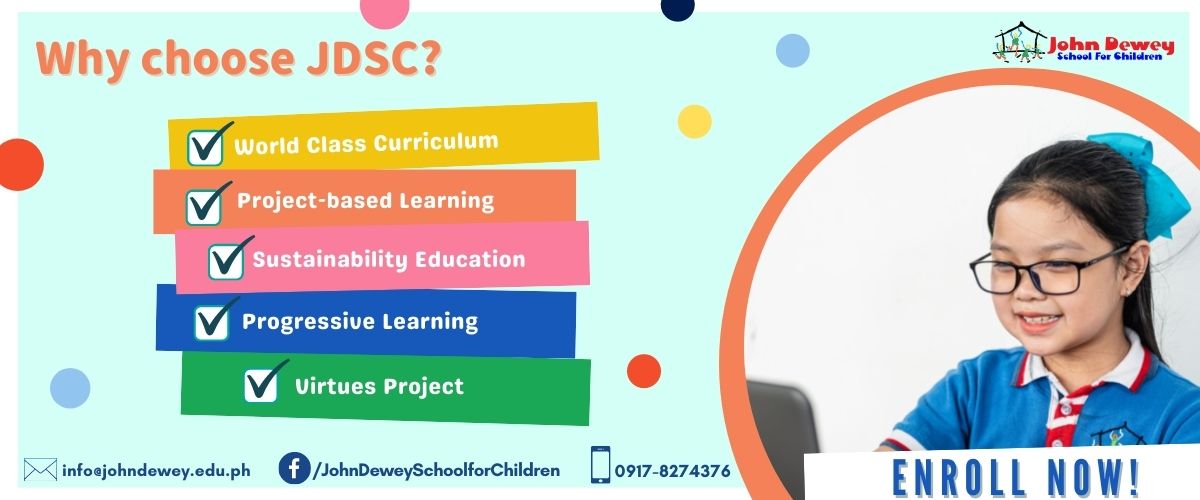How is John Dewey different from other schools?
Project-Based Learning
Aligned with John Dewey’s philosophy, JDSC students learn through project-based learning (PBL) which is experiential, participatory and transdisciplinary. PBL serves as the school’s platform for students to apply what they learned from the different subject disciplines to more practical, real-world situations.PBL involves real-life tasks and challenges and requires subjects to be interconnected and integrated. A project usually takes about a semester or a year to be completed.Deweyans, at the start of this school year, learned more about the COVID-19 pandemic and how the school community could help solve the issues it brought society. One of the projects included public education campaign on health protocols wherein children drafted letters, created posters, and made videos. Students also initiated donation drives to give personal protective equipment and food packs to healthcare workers in hospitals and low-income families. Likewise, grade school and high school students hosted webinars and invited doctors and experts as resource speakers to spread awareness about the illness and how to maintain public health and safety. For the second half of the school year, children embarked on learning more about how they and the school could help avoid pandemics in the future. This led them to dive into sustainability issues and learn more deeply about the following topics: climate change, human rights, mental health, leadership and governance, global digital citizenship, poverty and financial literacy. As part of their project, students, with the help of their teachers, hold webinars and invited experts to talk about the above mentioned topics. As a group, they read and researched more about their topic of interest and share what they learned in a webinar for parents. They also created films about their learnings which were featured in the JDSC Film Fest on Sustainability Education with the entire community watching each of the children’s film projects. The last quarter’s project requires students to help organize the global gathering The Call to Unite Schools towards Sustainability: Envisioning a Post-COVID-19 Education which is scheduled on May 22-23, 2021.
Sustainability Education Program
Over 30 years now, scientists have been providing research data and warnings that climate change is threatening humanity’s existence. Yet the urgency to take the necessary steps to address this complex issue has been too long delayed.
John Dewey School for Children embraces the concept of sustainability and is proud to carry it out as a community practice. While it is not a perfect system, the school has taken the necessary steps to develop and implement sustainability education programs in all levels: preschool, grade school, and high school. And based on our experience, the programs hold great promise.JDSC recognizes that the world is facing an emergency and societies face global problems that need global solutions. The community believes that to address the climate crisis, destruction of the natural world, and social inequities, there is a great need for ground level collaboration that should involve all individuals and all organizations, including schools and universities around the globe. JDSC answers this call by starting a movement for sustainability in the education sector through Partnerships for Sustainability Education (PSE).
Character Program: Virtues Project
To give our students the greatest opportunity for success, the school uses The Virtues Project as its character program. The Virtues Project allows character education to be a natural part of the students’ experience as children learn the different virtues within the context of their daily interactions.JDSC intentionally centers its curriculum on the practice of virtues such as resilience, unity, leadership, excellence, and service. Reflection and service are integral part of the students’ daily activities.Through The Virtues Project, the school ensures that students develop their character in a positive and empowering environment.
Internationalization Program
To appreciate diversity and develop global awareness and cross-cultural skills, JDSC brings some of its students outside the Philippines. The overseas experience meeting other children and adults in diverse cultures builds the learners’ network of friends as well as expand their learning about themselves, their country, and the world.For several years now, the school has been bringing Grade 3 to 10 students to sit-in classes in Singapore schools and to interact with their pupils and their teachers. They also visited places of interest such as nature parks, museums, galleries, universities, libraries, and restaurants.

